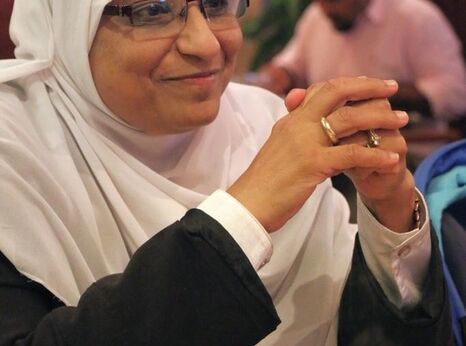Detained rights lawyer denied prison visits

On 1 November 2018, National Security Agency forces (NSA) broke into the house of Hoda Abdelmoniem in Cairo at 1:30 am, ransacked it, and took her blindfolded to her mother’s house. While the NSA forces searched her mother’s house, she was left blindfolded in a police vehicle. The officers confirmed to her daughter, who was present during the arrest, that they belonged to the NSA, but did not present an arrest warrant, mention the reason for her arrest or clarify where she was being taken. Hoda Abdelmoniem was not allowed to take any medicine or personal belongings with her.
After nearly three weeks of being subjected to enforced disappearance, she was brought to the State Supreme Security Prosecution (SSSP), a special branch of the prosecution responsible for investigating national security threats, on 21 November 2018. On the following day, 22 November, her relatives were able to see her at the SSSP office. They reported that she was wearing the same clothes she wore on the day of her arrest, appeared to be terrified, and refused to talk about her detention. She was then taken back to an undisclosed location. Her family briefly saw her again on 24 and 28 November 2018 at the SSSP office. She was subjected to enforced disappearance again between 2 December 2018 and 14 January 2019, as authorities refused to disclose her whereabouts to her relatives and lawyers.
On 15 January 2019, she appeared in front of SSSP prosecutors, who renewed her detention for 15 days. She told her daughter that she did not know where she was being detained. At the time, her daughter reported that she lost a lot of weight, apparently due to the insufficient and poor quality of food. Following her questioning by the SSSP, NSA forces took her blindfolded to an unknown location. After another two weeks of being subjected to enforced disappearance, she was transferred to al-Qanater Women’s Prison on 31 January 2019.
On the day of Hoda Abdelmoniem’s arrest, 1 November 2018, the Egyptian authorities launched a series of raids, arresting at least 31 human rights defenders and lawyers; 10 women and 21 men. The Egyptian Coordination for Rights and Freedoms (ECRF), which documents enforced disappearances and the use of the death penalty, and provides legal aid to victims of human rights violations, was particularly targeted by the crackdown. In a statement published on 1 November 2018 announcing the suspension of its human rights work, ECRF cited the situation in Egypt as incompatible with human rights work and demanded the UN Human Rights Council to intervene.
Hoda Abdelmoniem volunteered as a consultant for the ECRF and had been active in documenting human rights violations including cases of enforced disappearances. She is a former member of the National Council for Human Rights and of the Egyptian Bar Association. Hoda Abdelmoniem had been banned from travelling outside of Egypt since late 2013 without being charged with any offence.
From May 2020, Egyptian courts and prosecutions had extended detention orders for thousands of pre-trial detainees without their presence in flagrant violation of their due process rights, including the right to challenge the legality of their detention. While some defendants have been transferred to courts for their hearings since mid-July, others have not been taken to court since the resumption of court hearings on 1 May 2020. According to lawyers, judges also refused to hear their defence including concerns over the illegality of the renewal decisions in light of Egyptian law. During one of the hearings, a judge asked lawyers to nominate five among themselves to represent hundreds of defendants.